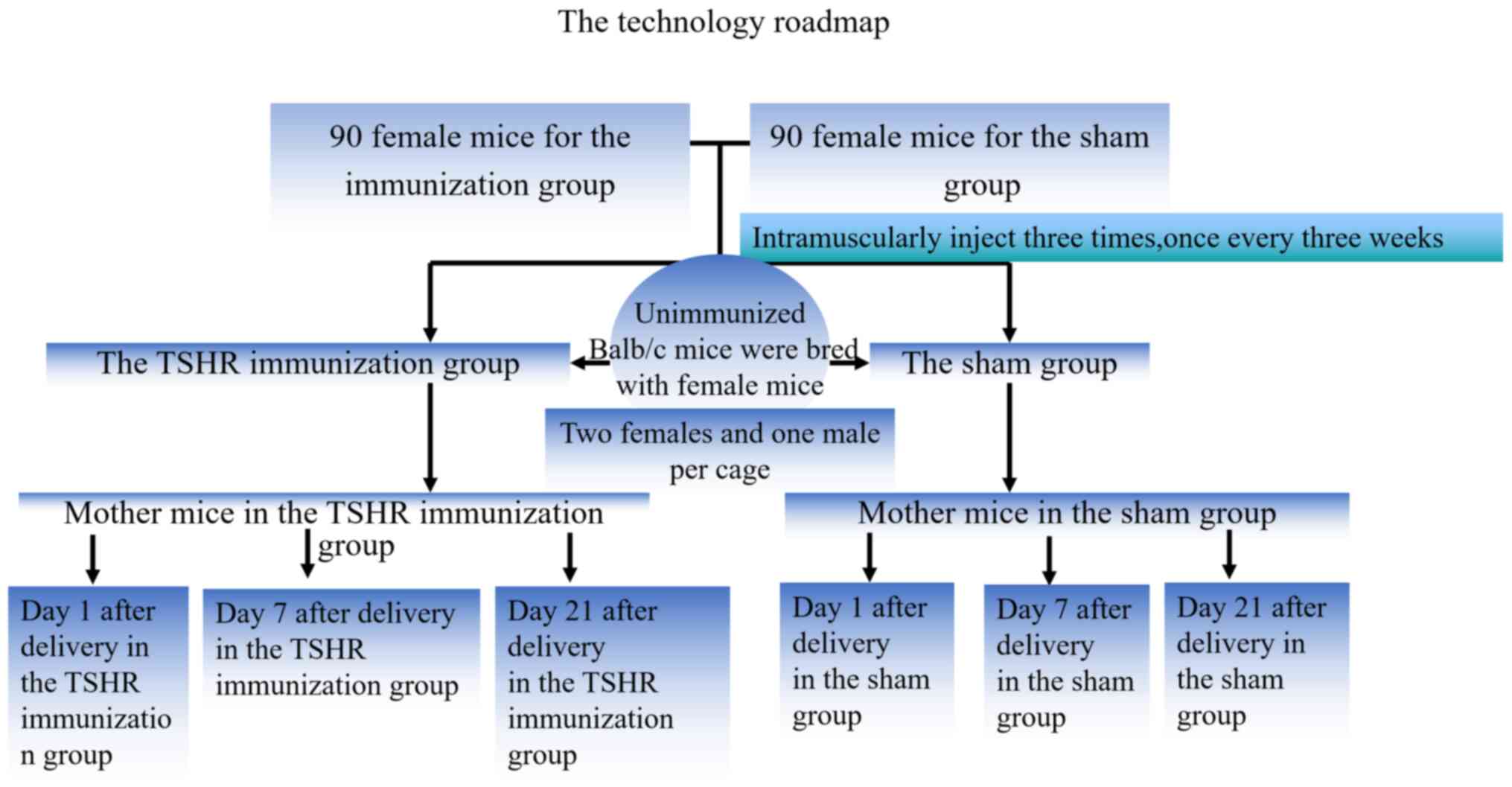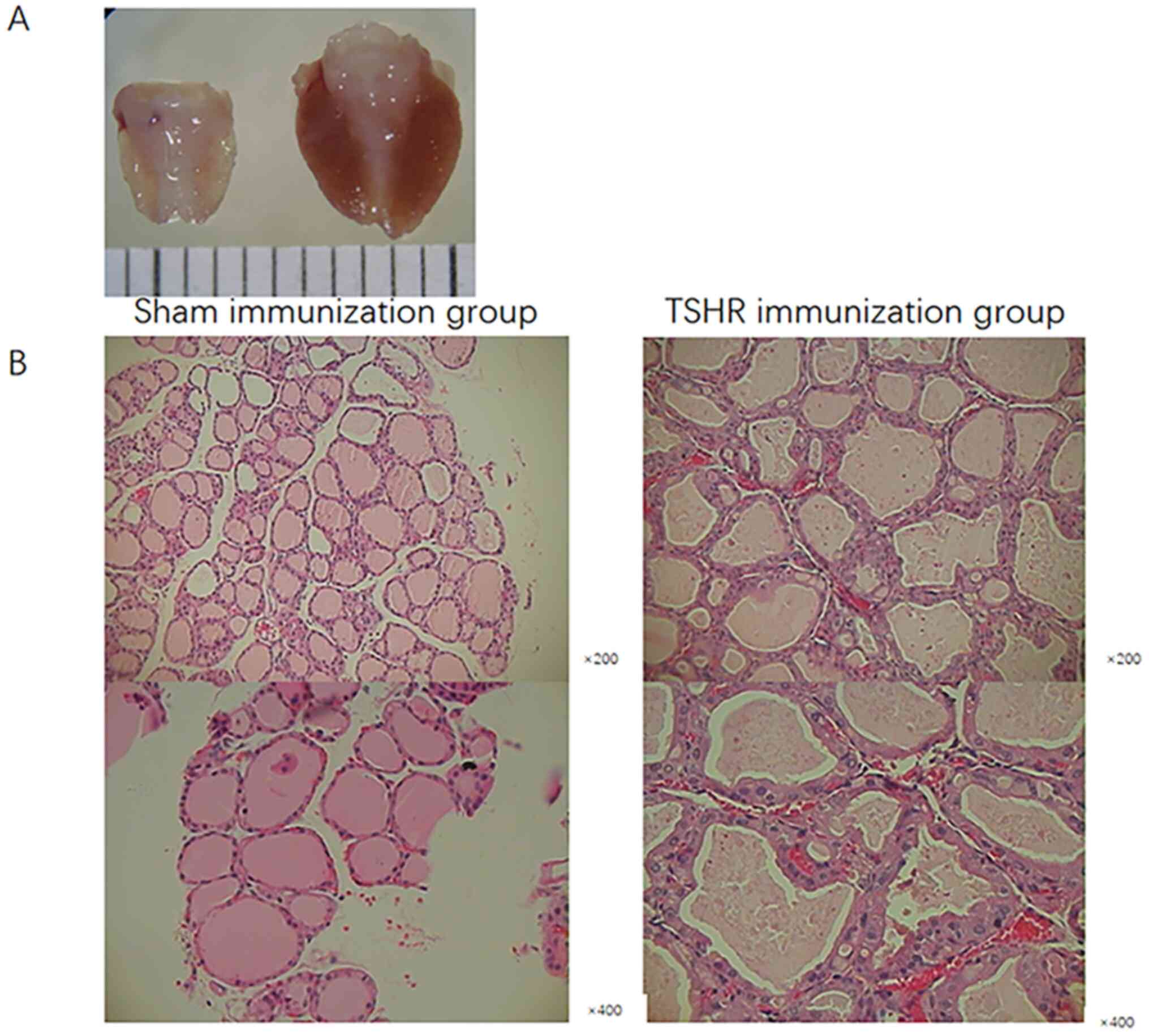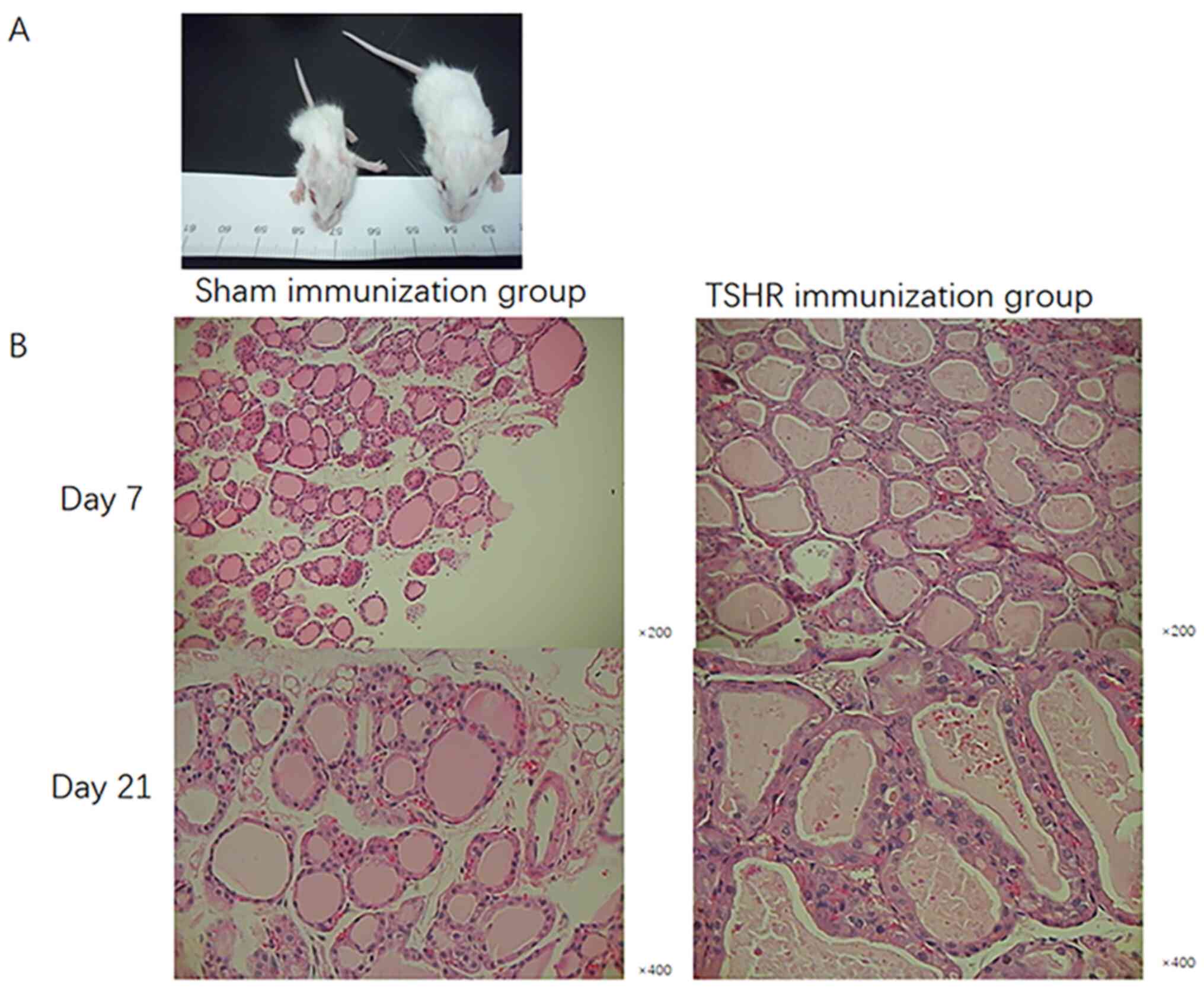|
1
|
Azizi F, Amouzegar A, Mehran L, Alamdari
S, Subekti I, Vaidya B, Poppe K, Sarvghadi F, San Luis T Jr and
Akamizu T: Management of hyperthyroidism during pregnancy in Asia.
Endocr J. 61:751–758. 2014.PubMed/NCBI View Article : Google Scholar
|
|
2
|
Nyström HF, Jansson S and Berg G:
Incidence rate and clinical features of hyperthyroidism in a
long-term iodine sufficient area of Sweden (Gothenburg) 2003-2005.
Clin Endocrinol (Oxf). 78:768–776. 2013.PubMed/NCBI View Article : Google Scholar
|
|
3
|
Burch HB and Cooper DS: Management of
graves disease: A review. JAMA. 314:2544–2554. 2015.PubMed/NCBI View Article : Google Scholar
|
|
4
|
Marinò M, Latrofa F, Menconi F, Chiovato L
and Vitti P: Role of genetic and non-genetic factors in the
etiology of Graves' disease. J Endocrinol Invest. 38:283–294.
2015.PubMed/NCBI View Article : Google Scholar
|
|
5
|
Paunkovic N and Paunkovic J: The
diagnostic criteria of Graves' disease and especially the
thyrotropin receptor antibody; our own experience. Hell J Nucl Med.
10:89–94. 2007.PubMed/NCBI
|
|
6
|
Törnhage CJ and Grankvist K: Acquired
neonatal thyroid disease due to TSH receptor antibodies in breast
milk. J Pediatr Endocrinol Metab. 19:787–794. 2006.PubMed/NCBI View Article : Google Scholar
|
|
7
|
Azizi F, Bahrainian M, Khamseh ME and
Khoshniat M: Intellectual development and thyroid function in
children who were breast-fed by thyrotoxic mothers taking
methimazole. J Pediatr Endocrinol Metab. 16:1239–1243.
2003.PubMed/NCBI View Article : Google Scholar
|
|
8
|
Mandel SJ and Cooper DS: The use of
antithyroid drugs in pregnancy and lactation. J Clin Endocrinol
Metab. 86:2354–2359. 2001.PubMed/NCBI View Article : Google Scholar
|
|
9
|
Momotani N, Yamashita R, Makino F, Noh JY,
Ishikawa N and Ito K: Thyroid function in wholly breast-feeding
infants whose mothers take high doses of propylthiouracil. Clin
Endocrinol (Oxf). 53:177–181. 2000.PubMed/NCBI View Article : Google Scholar
|
|
10
|
Speller E and Brodribb W: Breastfeeding
and thyroid disease: A literature review. Breastfeed Rev. 20:41–47.
2012.PubMed/NCBI
|
|
11
|
Stagnaro-Green A, Abalovich M, Alexander
E, Azizi F, Mestman J, Negro R, Nixon A, Pearce EN, Soldin OP,
Sullivan S, et al: Guidelines of the American thyroid association
for the diagnosis and management of thyroid disease during
pregnancy and postpartum. Thyroid. 21:1081–1125. 2011.PubMed/NCBI View Article : Google Scholar
|
|
12
|
Chen CR, Pichurin P, Nagayama Y, Latrofa
F, Rapoport B and McLachlan SM: The thyrotropin receptor
autoantigen in Graves disease is the culprit as well as the victim.
J Clin Invest. 111:1897–1904. 2003.PubMed/NCBI View
Article : Google Scholar
|
|
13
|
Green AP, Huang JJ, Scott MO, Kierstead
TD, Beaupré I, Gao GP and Wilson JM: A new scalable method for the
purification of recombinant adenovirus vectors. Hum Gene Ther.
13:1921–1934. 2002.PubMed/NCBI View Article : Google Scholar
|
|
14
|
Yakimovich A, Andriasyan V, Witte R, Wang
IH, Prasad V, Suomalainen M and Greber UF: Plaque2.0-A
high-throughput analysis framework to score virus-cell transmission
and clonal cell expansion. PLoS One. 10(e0138760)2015.PubMed/NCBI View Article : Google Scholar
|
|
15
|
Smith BR, Bolton J, Young S, Collyer A,
Weeden A, Bradbury J, Weightman D, Perros P, Sanders J and
Furmaniak J: A new assay for thyrotropin receptor autoantibodies.
Thyroid. 14:830–835. 2004.PubMed/NCBI View Article : Google Scholar
|
|
16
|
Xia N, Ye X, Hu X, Song S, Xu H, Niu M,
Wang H and Wang J: Simultaneous induction of Graves'
hyperthyroidism and Graves' ophthalmopathy by TSHR genetic
immunization in BALB/c mice. PLoS One. 12(e0174260)2017.PubMed/NCBI View Article : Google Scholar
|
|
17
|
Wu L, Xun L, Yang J, Xu L, Tian Z, Gao S,
Zhang Y, Hou P and Shi B: Induction of murine neonatal tolerance
against Graves' disease using recombinant adenovirus expressing the
TSH receptor A-subunit. Endocrinology. 152:1165–1171.
2011.PubMed/NCBI View Article : Google Scholar
|
|
18
|
Holder AT, Aston R, Rest JR, Hill DJ,
Patel N and Ivanyi J: Monoclonal antibodies can enhance the
biological activity of thyrotropin. Endocrinology. 120:567–573.
1987.PubMed/NCBI View Article : Google Scholar
|
|
19
|
van Trotsenburg ASP: Management of
neonates born to mothers with thyroid dysfunction, and points for
attention during pregnancy. Best Pract Res Clin Endocrinol Metab.
34(101437)2020.PubMed/NCBI View Article : Google Scholar
|
|
20
|
Shimojo N, Kohno Y, Yamaguchi K, Kikuoka
S, Hoshioka A, Niimi H, Hirai A, Tamura Y, Saito Y, Kohn LD and
Tahara K: Induction of Graves-like disease in mice by immunization
with fibroblasts transfected with the thyrotropin receptor and a
class II molecule. Proc Natl Acad Sci USA. 93:11074–11079.
1996.PubMed/NCBI View Article : Google Scholar
|
|
21
|
Costagliola S, Many MC, Denef JF, Pohlenz
J, Refetoff S and Vassart G: Genetic immunization of outbred mice
with thyrotropin receptor cDNA provides a model of Graves' disease.
J Clin Invest. 105:803–811. 2000.PubMed/NCBI View
Article : Google Scholar
|
|
22
|
Holthoff HP, Goebel S, Li Z, Faßbender J,
Reimann A, Zeibig S, Lohse MJ, Münch G and Ungerer M: Prolonged TSH
receptor A subunit immunization of female mice leads to a long-term
model of Graves' disease, tachycardia, and cardiac hypertrophy.
Endocrinology. 156:1577–1589. 2015.PubMed/NCBI View Article : Google Scholar
|
|
23
|
Kita-Furuyama M, Nagayama Y, Pichurin P,
McLachlan SM, Rapoport B and Eguchi K: Dendritic cells infected
with adenovirus expressing the thyrotrophin receptor induce Graves'
hyperthyroidism in BALB/c mice. Clin Exp Immunol. 131:234–240.
2003.PubMed/NCBI View Article : Google Scholar
|
|
24
|
Kaneda T, Honda A, Hakozaki A, Fuse T,
Muto A and Yoshida T: An improved Graves' disease model established
by using in vivo electroporation exhibited long-term immunity to
hyperthyroidism in BALB/c mice. Endocrinology. 148:2335–2344.
2007.PubMed/NCBI View Article : Google Scholar
|
|
25
|
Piccinni MP and Romagnani S: Regulation of
fetal allograft survival by hormone-controlled Th1- and Th2-type
cytokines. Immunol Res. 15:141–150. 1996.PubMed/NCBI View Article : Google Scholar
|
|
26
|
Di Bari F, Perelli S, Scilipoti A,
Wasniewska M, Vita R, Vermiglio F, Benvenga S and Moleti M:
Stress-Triggered Graves' Disease with multiple exacebations in a
pregnant woman with levels of thyrotropin receptor antibodies and
no complicated delivery: A case report. SN Compr Clin Med.
2:355–360. 2020.
|
|
27
|
Weetman AP: Immunity, thyroid function and
pregnancy: Molecular mechanisms. Nat Rev Endocrinol. 6:311–318.
2010.PubMed/NCBI View Article : Google Scholar
|
|
28
|
Bucci I, Giuliani C and Napolitano G:
Thyroid-stimulating hormone receptor antibodies in pregnancy:
Clinical relevance. Front Endocrinol (Lausanne).
8(137)2017.PubMed/NCBI View Article : Google Scholar
|
|
29
|
Vita R, Lapa D, Vita G, Trimarchi F and
Benvenga S: A patient with stress-related onset and exacerbations
of Graves' disease. Nat Clin Pract Endocrinol Metab. 5:55–61.
2009.PubMed/NCBI View Article : Google Scholar
|
|
30
|
Batra CM: Fetal and neonatal
thyrotoxicosis. Indian J Endocrinol Metab. 17 (Suppl 1):S50–S54.
2013.PubMed/NCBI View Article : Google Scholar
|
|
31
|
Laurberg P, Wallin G, Tallstedt L,
Abraham-Nordling M, Lundell G and Tørring O: TSH-receptor
autoimmunity in Graves' disease after therapy with anti-thyroid
drugs, surgery, or radioiodine: A 5-year prospective randomized
study. Eur J Endocrinol. 158:69–75. 2008.PubMed/NCBI View Article : Google Scholar
|
|
32
|
Van de Perre P: Transfer of antibody via
mother's milk. Vaccine. 21:3374–3376. 2003.PubMed/NCBI View Article : Google Scholar
|


















